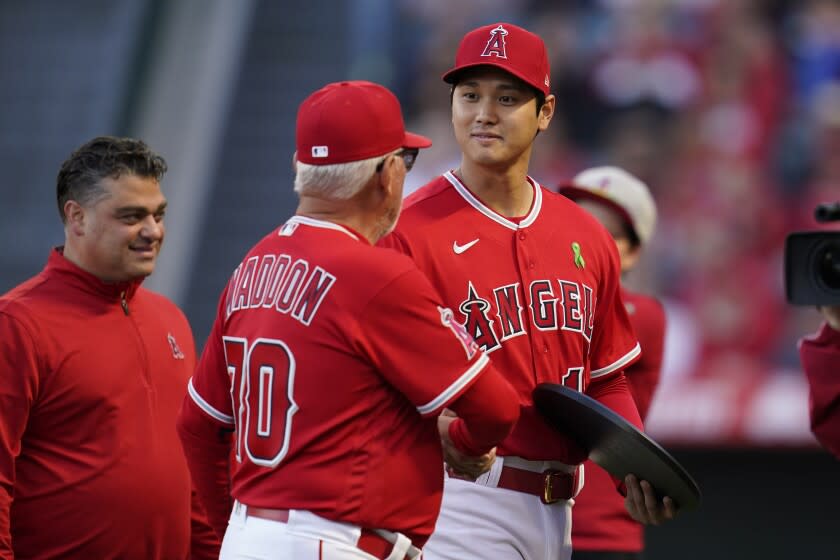Commentary: In firing Joe Maddon, Angels and Perry Minasian act boldly but risk more dysfunction

For the waning years of the previous century, the Angels were ruled by five words that should have been a rallying cry, not a management strategy: Win one for the Cowboy!
The Angels never did. For 15 seasons, including the final years of founding owner Gene Autry’s life, they repeatedly shuffled the roster, the coaching staff and the management in sincere pursuit of that elusive championship for their beloved cowboy. They won zero postseason games.
The Angels last won a postseason game 13 years ago. They have again fallen victim to the well-meaning urgency of five words: Win one for Mike Trout!
After the winter shuffle of the coaching staff, and the annual shuffle of the pitching staff, they hit shuffle again Tuesday with the firing of manager Joe Maddon.
In isolation, the move is defensible, even if general manager Perry Minasian was vague in defending it. Minasian talked about “a different voice” and “changing the mix,” but he really did not need to elaborate. The Angels had not won a game in two weeks and had lost their last 12 games before Tuesday, and Minasian sensed a season in jeopardy for a team he believes can advance to the playoffs.
“We’ve got 106 games to prove it,” Minasian said. “Talk is cheap.”
Give Minasian credit. He did not scapegoat a hitting coach or a pitching coach. He got the approval of Angels owner Arte Moreno to fire the manager Moreno himself hired.
Yet the Angels appear to be slipping back into the dysfunction that predated 2002, the year of the World Series championship so prominent in the Angels’ 2022 marketing.
Tim Salmon, one of the most revered players in team history, stood in an Angel Stadium hallway Tuesday. In 2022, he is a broadcaster for the Angels. In 2002, he was the right fielder who had endured a lost decade on the way to that championship.
Salmon joined the Angels in 1992. In his first eight seasons, he played for three managers, three interim managers and three general managers.
“I can tell you, as a player going through that, it was very difficult,” Salmon said. “I just want to be in a situation where I’m left alone and I have room to do what I do, without all the distractions.
“This is a huge distraction for the players. It’s a hornet’s nest of distraction right now.”
After the 1999 season, which included a player mutiny, the Angels hired Bill Stoneman as general manager. He hired Mike Scioscia as manager, and Scioscia led an all-star coaching staff that included three future major league managers: Maddon, Bud Black and Ron Roenicke.
“You look at the greatest period of success we had in this organization, and it was when Stoneman came and Scioscia and that coaching staff,” Salmon said. “There was a long period of time there where there was stability, and that definitely goes a long way.”
In a win-now organization, the pressure now falls solely upon Minasian. Stoneman retired from his position after the 2007 season, and Moreno has blessed Minasian with autonomy he did not provide to all of his general managers.
Tony Reagins never got to hire his own manager. Jerry Dipoto never got to hire his own manager. Billy Eppler had to wait for Scioscia’s contract to run out before he could hire one, then had to defer to Moreno firing his guy. Minasian now gets to hire his own guy.
In modern baseball, where the word “collaboration” is heard more often than the word “bunt,” that is how a major league organization should work. For the Angels, better late than never. For Minasian, a first-time general manager working with a first-time major league manager, the results are on him in an organization that is not long on patience.
“All of us are accountable,” Minasian said. “Obviously me, front and center.”
Since Scioscia retired from his position, at the end of the 2018 season, the Angels have had three managers in four seasons.
The last Angels manager to last three full seasons, aside from Scioscia: Gene Mauch. That was 35 years ago. The way they got out of the “Win one for the Cowboy” rut: rebuild and let the kids play, which Moreno has declined to consider with Trout.
On Tuesday, Salmon said he had heard from a number of his teammates from that era, including Garret Anderson, Damion Easley, Jim Edmonds, Darin Erstad and Troy Percival. The man who ran the Angels’ minor league system at the time: Maddon.
“The core of our winning foundation here, Joe was in charge of that,” Salmon said.
This is no way to run a team: new manager for the 2019 season, new manager for the 2020 season, new general manager for the 2021 season, new manager two months into the 2022 season.
At some point, that is less a reflection on the particular individuals and more on the Angels’ ownership, which by that track record has repeatedly failed to hire the right people or grant them autonomy to do their work.
Shohei Ohtani joined the Angels in 2018. Phil Nevin, who was third-base coach and became the Angels’ interim manager Tuesday, is his fourth manager in five seasons. Nevin is not guaranteed next season.
That is the final season during which Ohtani is bound to the Angels. If Ohtani heads into free agency with his Angels tenure defined by five managers and zero postseason appearances, well, it’s been fun while it lasted.
This story originally appeared in Los Angeles Times.

